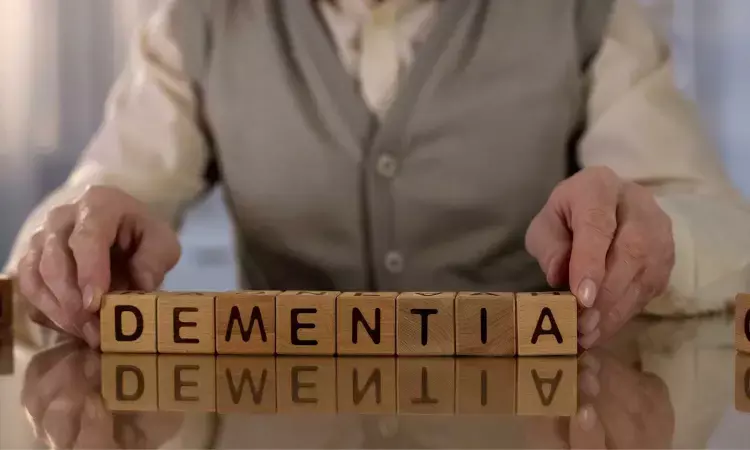- Home
- Medical news & Guidelines
- Anesthesiology
- Cardiology and CTVS
- Critical Care
- Dentistry
- Dermatology
- Diabetes and Endocrinology
- ENT
- Gastroenterology
- Medicine
- Nephrology
- Neurology
- Obstretics-Gynaecology
- Oncology
- Ophthalmology
- Orthopaedics
- Pediatrics-Neonatology
- Psychiatry
- Pulmonology
- Radiology
- Surgery
- Urology
- Laboratory Medicine
- Diet
- Nursing
- Paramedical
- Physiotherapy
- Health news
- Fact Check
- Bone Health Fact Check
- Brain Health Fact Check
- Cancer Related Fact Check
- Child Care Fact Check
- Dental and oral health fact check
- Diabetes and metabolic health fact check
- Diet and Nutrition Fact Check
- Eye and ENT Care Fact Check
- Fitness fact check
- Gut health fact check
- Heart health fact check
- Kidney health fact check
- Medical education fact check
- Men's health fact check
- Respiratory fact check
- Skin and hair care fact check
- Vaccine and Immunization fact check
- Women's health fact check
- AYUSH
- State News
- Andaman and Nicobar Islands
- Andhra Pradesh
- Arunachal Pradesh
- Assam
- Bihar
- Chandigarh
- Chattisgarh
- Dadra and Nagar Haveli
- Daman and Diu
- Delhi
- Goa
- Gujarat
- Haryana
- Himachal Pradesh
- Jammu & Kashmir
- Jharkhand
- Karnataka
- Kerala
- Ladakh
- Lakshadweep
- Madhya Pradesh
- Maharashtra
- Manipur
- Meghalaya
- Mizoram
- Nagaland
- Odisha
- Puducherry
- Punjab
- Rajasthan
- Sikkim
- Tamil Nadu
- Telangana
- Tripura
- Uttar Pradesh
- Uttrakhand
- West Bengal
- Medical Education
- Industry
Blood test shows promise for early detection of dementia: Study

For people with a certain sleep disorder, a simple blood test could help predict the development of dementia years before symptoms appear, a new study indicates.
Idiopathic REM sleep behaviour disorder (iRBD) causes people to physically act out their dreams while sleeping. The disorder is also associated with a very high risk of Parkinson’s disease and a related condition called Dementia with Lewy Bodies. This is a form of dementia that often causes memory and cognitive loss, as well as vivid visual hallucinations and movement difficulties similar to Parkinson’s.
McGill University researchers have discovered that a blood test, originally developed to detect Alzheimer’s disease, could also identify which patients with the iRBD sleep disorder are most likely to develop Dementia with Lewy Bodies. The blood test analyzes two proteins in the blood that serve as biomarkers for Alzheimer’s.
"Detecting dementia risk early could have significant implications for how doctors guide patients, helping them plan for the future and potentially allowing for more personalized, effective treatments,” said Dr. Ronald Postuma, a Professor in McGill’s Department of Neurology and a clinical researcher at The Neuro (Montreal Neurological Institute-Hospital).
Researchers followed 150 iRBD patients, testing their blood for the biomarkers and tracking their health annually. Remarkably, the blood test, taken four years before, predicted dementia in almost 90 per cent of the patients who later developed the disease.
Finding links between brain diseases
This study, published in the journal Brain, also suggests the early stages of Parkinson’s and Alzheimer’s have more in common than previously thought.
"Our findings suggest that Alzheimer’s treatments could also be tested in patients with this sleep disorder. Perhaps, if treatments start early enough, Dementia with Lewy Bodies can be prevented,” said first author Dr. Aline Delva, who was a research fellow at The Neuro during the study.
The research team plans to expand the study to confirm how well the test can predict dementia risk in patients with diagnosed Parkinson’s disease as well as other populations at risk for Dementia with Lewy Bodies.
Reference:
Aline Delva, Amélie Pelletier, Emma Somerville, Jacques Montplaisir, Jean-François Gagnon, Gwendlyn Kollmorgen, Tony Kam-Thong, Thomas Kustermann, Venissa Machado, Ziv Gan-Or, Ronald B Postuma, Plasma pTau181 and amyloid markers predict conversion to dementia in idiopathic REM sleep behaviour disorder, Brain, 2025;, awaf003, https://doi.org/10.1093/brain/awaf003
Dr Kamal Kant Kohli-MBBS, DTCD- a chest specialist with more than 30 years of practice and a flair for writing clinical articles, Dr Kamal Kant Kohli joined Medical Dialogues as a Chief Editor of Medical News. Besides writing articles, as an editor, he proofreads and verifies all the medical content published on Medical Dialogues including those coming from journals, studies,medical conferences,guidelines etc. Email: drkohli@medicaldialogues.in. Contact no. 011-43720751


